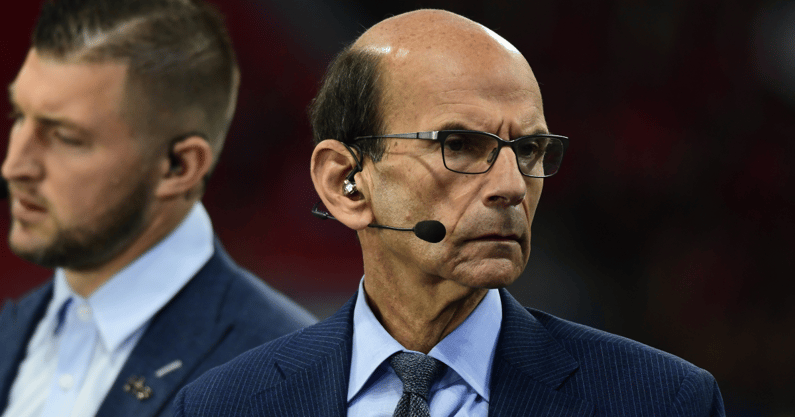Paul Finebaum: College football is headed toward reckoning

After Alabama coach Nick Saban slammed the current state of college football last week, ESPN analyst Paul Finebaum is weighing in. Saban was critical of new NIL and transfer portal rules and how they have led to an unfair recruiting advantage for some programs, calling the model “unsustainable.”
In a recent appearance on McElroy and Cubeling in the Morning, Finebaum agreed with Saban’s statement. The ESPN analyst suggested that unless something changes quickly, the future college football as we know it is in major trouble.
“I think ultimately we are going to see an explosion in college football unlike anything that’s ever happened before,” Finebaum said. “I don’t know how the current model will survive. There’s just no way. It’s struggling right now. There are already a lot of have-nots. I mean, there’s a team in the SEC that can’t compete right now. You know that. I don’t remember a time like that. Usually, maybe you’d have a bad year or two, but you could come back. I can’t give you a date because this is moving so fast, but I think in a relatively short period of time we are going to have 25 or 30 super teams. Whether they’re in leagues like they currently are? I suspect they will be.”
In response to the changing NIL legislation across the country on a state level, many schools have established “collectives,” which help players find NIL opportunities and create a more uniform value across the roster.
However, these collectives also provide boosters the opportunity to channel payments that used to be an NCAA violation into a new channel that could still impact players’ decisions. Many major schools, including Alabama, Clemson, Georgia and Ohio State, have already put collectives in place for their student athletes.
There are still many schools that have yet to announce such programs, creating an uneven playing field. Laws regarding NIL differ from state to state, so some universities are able to offer opportunities that others can’t. Paul Finebaum believes this will ultimately lead to a greater disparity in college football recruiting classes, with a select few schools consistently bringing in the nation’s top recruits.
“The competitiveness of the games is going to get even more outrageous,” the ESPN analyst said. “A lot of programs just can’t do what Texas A&M, Alabama and Georgia are currently doing. It’s a model that’s already broken, but I don’t have any faith in the NCAA itself to correct it. You can have a committee meeting every week if you want and try to rewrite the rule books, but it’s still a broken model. I think you’ll wake up one day and it won’t be there. You’ll see college football and there will be 25 or 30 teams playing and that’s going to be about it.”
Top 10
- 1Live
Ole Miss storms field
Celebration starts too early after beating Georgia
- 2New
Todd Golden speaks
Statement released amid stalking accusations
- 3
Goalposts down
Georgia Tech fans march through campus after upsetting Miami
- 4
Smoke delay
Ole Miss vs. Georgia delayed after fireworks display clouds field
- 5
Ole Miss squirrel returns
Critter back in Oxford, delays game
Some have already begun to question the practices of Texas A&M, which signed the No. 1 recruiting class in 2022 according to On3 Consensus. That is highlighted by five-star receiver Evan Stewart, who has a massive NIL valuation of $775,000, which ranks first among players in the 2022 class. Including Stewart, the Aggies brought in four players whose NIL valuation is $80,000 or more.
Both Saban and Ole Miss coach Lane Kiffin have spoken out on NIL in recruiting, alluding to A&M’s class.
“I’m for that the kids make money, it’s just there’s no – I’ve said it since day one – put no salary cap in the NFL and how does that work?” Kiffin asked. “Different teams have different money and then there’s no real contracts on a lot of it. You’re not necessarily locked in, so technically everybody could be a free agent every year.
“Think about how messed up the system is, if you’re a great player – you’re Bryce Young after the national championship last year – you should go in the portal, even if you want to stay at Alabama because all you’ll do is drive up your price there. Then the collectives will suddenly come with a lot of money from Alabama people to keep you. So what would any player do that could opt into a free agency every year? They would do it. Test the market and it’s mostly good.”
The changes to NIL laws are generally regarded as a positive thing, and they’re certainly here to stay. But with these new rules still in their infancy, it’s clear that there is still plenty of work to be done.